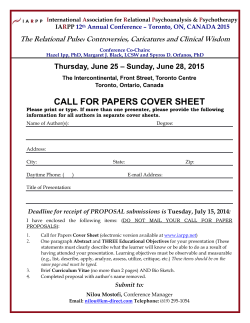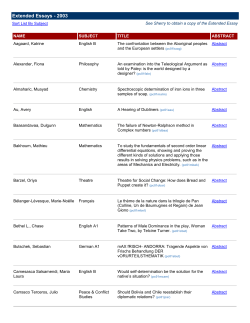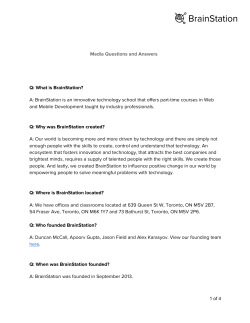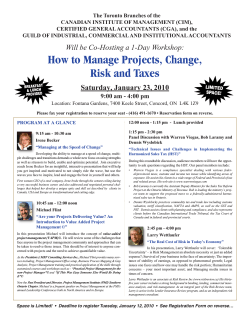
1 Michael J. Siebert
MICHAEL J. SIEBERT – CURRICULUM VITAE Michael J. Siebert Department of Philosophy 170 St. George St. Toronto, ON M5R 2M8 Canada 416-220-0180 m.siebert@utoronto.ca Citizenship: Canadian Teaching and Research Interests AOS AOC Medieval Philosophy Ancient Philosophy, Early Modern Philosophy, Philosophy of Religion Research Languages English (mother tongue), Classical Greek, Classical Latin, French, German Education 2005-2014 PhD, Philosophy, University of Toronto Dissertation: Platonic Recollection and Illumination in Augustine’s Early Writings Committee: Dr. Peter King (supervisor), Dr. Lloyd Gerson, Dr. John Magee 2003-05 MA, Early Christian Studies, University of Notre Dame MA Project: “Augustine, Human Happiness, and Cicero’s Tusculan Disputations” Supervisor: Dr. Sabine MacCormack 1996-03 BA Honours, Philosophy, University of Winnipeg 1996-00 BChurch Music, Choral Conducting, Concord College Academic Work Experience 1. Instructorships (Sessional) UNIVERSITY OF TORONTO 2014 Summer 2009 Winter 17th and 18th Cent. Philosophy (PHL210Y1Y S-Term only) Topics in Medieval Philosophy (PHL307H5S) 2. Teaching Assistantships (Tutorial Leader) UNIVERSITY OF TORONTO 2013-14 Year 17th and 18th Cent. Philosophy, M. Morrison (PHL210Y) 2012-13 Year Introduction to Philosophy, J. Nagel (PHL105Y) 2011-12 Year 17th and 18th Cent. Philosophy, M. Pickavé & A. Gombay (PHL210Y) 2010-11 Year 17th and 18th Cent. Philosophy, M. Morrison (PHL210Y) 2009-10 Year Ancient Philosophy, L. Gerson (PHL 200Y) 2007-09 Year (2x) Introduction to Philosophy, J. Brunning (PHL105Y) 2006-07 Year Ancient Philosophy, L. Gerson (PHL 200Y) 3. Teaching Assistantships (Grader) UNIVERSITY OF TORONTO 2014 Winter 2007 Summer 2006 Summer Introduction to Philosophy, R. de Sousa (PHL 201S) Business Ethics, D. Waterfall (PHL 295S) Plato, L. Gerson (PHL303F) 1 MICHAEL J. SIEBERT – CURRICULUM VITAE 2005-2006 Year 2005 Fall 2 Ancient Philosophy, T. Mathien (PHL200Y) Early Medieval Philosophy, P. King (PHL205F) 4. Research Assistantships 2009-2011 With B. Inwood, University of Toronto Proofread for three issues of Oxford Studies in Ancient Philosophy 2010 Fall With B. Inwood, University of Toronto Proofread for Interdisciplinary Science Reviews: History and Human Nature 35.3-4 (2010) 2009 Fall With L. Gerson, University of Toronto Compiled Index Locorum for Cambridge History of Philosophy in Late Antiquity (Cambridge: Cambridge University Press, 2010) 2003-2004 With G. Reydams-Schils, University of Notre Dame Proofread and checked references for The Roman Stoics: Self, Responsibility, and Affection (Chicago: University of Chicago Press, 2005) Works in Progress Intended for Publication “Augustine’s Confessions 10.20.29 and Platonic Recollection” “Ciceronian Insights into Hume’s Dialogues Concerning Natural Religion” Presentations 1. Refereed Conference Presentations “Augustine’s Confessions and Platonic Recollection,” American Philosophical Association Central Division, New Orleans, February 20-23, 2013. “The Status of Recollection in Augustine’s Soliloquies,” Canadian Philosophical Association, Carleton University, May 25-28, 2009. “The Status of Recollection in Augustine’s Soliloquies,” Panel Presentation: Patristics, Medieval, and Renaissance Conference. Villanova University, October 10-12, 2008 “Philosophy, Religion, and Politics in Cicero’s On the Nature of the Gods,” Atlantic Regional Philosophical Association. St. Mary’s University, Halifax, October 26-27, 2007 “The Changing Educational Role of Philosophy and the Liberal Arts in Augustine’s De Ordine and De Doctrina Christiana,” Patristics, Medieval, and Renaissance Conference. Villanova University, October 19-21, 2007. 2. Invited Lectures, Presentations, and Commentaries “Platonic Recollection and Illumination in Augustine’s Early Writings,” Dissertation Presentation, Collaborative Program in Ancient and Medieval Philosophy Proseminar, University of Toronto, October 28, 2013. Commentary on Tyler Huismann, “Two Senses of Freedom in Augustine,” Freedom & Freedoms: Uniting State, Responsibility, and Will, University of Toronto, April 15-16, 2011. Three Informal Lectures on Athanasius of Alexandria’s On the Incarnation. St. Thomas’s Anglican Church, Toronto, November 26, December 3, 10, 2008. Commentary on Noah Levin, “A Defense of Protagorean Relativism Against Claims of SelfRefutation in Plato’s Theaetetus: A Plausible Explanation of Truth from Experience,” Experience and Truth: Eighth Annual International Graduate Conference in Philosophy. University of Toronto, May 9-10, 2008. Three Informal Lectures on Augustine’s Confessions. St. Thomas’s Anglican Church, Toronto, February 13, 27, March 5, 2008. MICHAEL J. SIEBERT – CURRICULUM VITAE 3 Commentary on Hugo Meyell, Redirecting Philosophy: Reflections on the Nature of Knowledge from Plato to Lonergan (Toronto, 1998): Canadian Society of Christian Philosophers. University of Saskatchewan, May 30, 2007. Awards 2010-11 2010 2009 2006-09 2006-09 2007-08 2005 2003-05 2002 2000 2000 1998 1998 1996 Doctoral Award, University of Toronto (Tuition+$10,000) Michael J. Herman Graduate Fellowship in Philosophy, University of Toronto Shortlisted for the Martha Lile Love Teaching Award George Paxton Young Memorial Prizes In Philosophy (1 per year), University of Toronto Gordon Cheesborough Travel Awards (1 per year), University of Toronto Ontario Government Scholarship University of Toronto 5-year Funding Package University of Notre Dame Tuition Scholarship and Stipend (1 per year) Victor Y. Shimizu Kant Prize, University of Winnipeg Chancellor's Gold Medal for the Highest Standing in Arts (4-year course), University of Winnipeg University Gold Medal in Music (4-year course), University of Winnipeg R. Fletcher Argue Scholarship, University of Winnipeg Sigrid Redekopp Memorial Scholarship in Music, Concord College Alumni Entrance Scholarship for Leadership, Concord College Service to Department 2007-2008 Chair, Graduate Conference Committee, Experience and Truth: Eighth Annual International Graduate Conference in Philosophy, University of Toronto, May 9-10, 2008 2006-2007 Philosophy Colloquium Student Representative, Graduate Philosophy Students Union. University of Toronto Memberships 2011-present Member, American Philosophical Association 2009-present Member, Canadian Philosophical Association References 1. Research Peter King, Professor of Philosophy and Medieval Studies, University of Toronto Department of Philosophy, 170 St. George St., Toronto, ON M5R 2M8 peter.king@utoronto.ca Lloyd Gerson, Professor of Philosophy, University of Toronto Department of Philosophy, 170 St. George St., Toronto, ON M5R 2M8 lloyd.gerson@utoronto.ca John Magee, Professor of Classics and Medieval Studies, University of Toronto Centre for Medieval Studies, 125 Queen's Park, Toronto, ON M5S 2C7 john.magee@utoronto.ca (for a reference letter, please email mf.ellison@utoronto.ca) 2. Teaching Martin Pickavé, Associate Professor of Philosophy and Medieval Studies, University of Toronto Department of Philosophy, 170 St. George St., Toronto, ON M5R 2M8 martin.pickave@utoronto.ca MICHAEL J. SIEBERT – CURRICULUM VITAE 4 Appendix A: Dissertation Abstract Platonic Recollection and Illumination in Augustine’s Early Writings Will any longest possible straight line inside of a circle have to pass through the center? Augustine of Hippo (354 – 430 CE) certainly thought so and he thought that others would too. The experience of learning such “intelligible things” (intellegibilia), as he called them, fascinated him, and unlike most contemporary philosophers, thought the experience was loaded with epistemological and metaphysical implications. The implication for which he is particularly famous is his contention that the experience requires an “illumination” from the divine. There are disputes about what this contention means precisely, but it begins from the claim that there is an analogy between seeing visible things and knowing intelligible things. Just as seeing visible things happens by means of the illumination of the sun, so also “seeing” intelligible things happens by means of an illumination from God. Without this divine illumination, intelligible things would not truly be “intelligible,” i.e. knowable. This illumination theory of learning is typically interpreted as an alternative to a Platonic recollection theory, since it seems not to require innate knowledge and the soul’s preexistence. The Augustine scholar Gerard O’Daly, for example, says that from start to finish, Augustine’s theory of illumination was an “explicit and unequivocal” alternative to Platonic recollection. My contention in this dissertation is that this was not always the case. I argue that at least in his pre-baptismal (and post-conversion) writings (386-7), Augustine not only entertained but also accepted Platonic recollection as a complement to illumination. In making my case, I provide original insight into interpreting Augustine’s Soliloquies and his obscure On the Immortality of the Soul. This insight reveals his attempted reconciliation of these theories and some underlying philosophical motivations. I also argue that Augustine’s preferred way of reconciling the theories in these works was highly unorthodox, entailing, among other things, that the soul was uncreated and consubstantial with God. These rarely defended claims indicate that the nature of Augustine’s conversion to Christianity is commonly misunderstand and suggest avenues for re-examining Augustine’s later writings and legacy. MICHAEL J. SIEBERT – CURRICULUM VITAE Appendix B: Graduate Courses Taken for Credit University of Notre Dame (2003-5) LANGUAGE Greek: Age of Herodotus Greek: Early Greek Poetry Latin: Introduction to Christian Latin Latin: Roman Comedy ANCIENT PHILOSOPHY AND POLITICAL THEORY Cicero and Roman Political Traditions (CLAS 598) Plato’s Trilogy (POLS 571) EARLY CHRISTIAN PHILOSOPHY AND THEOLOGY Augustine and Anselm (THEO 623) Early Christianity Seminar: Augustine (THEO 621) Topics in Early Christianity: Christianity and Empire (THEO 525) Early Christianity: Introduction (THEO 521) Patristic Exegesis (THEO 525) University of Toronto (2005-7) LANGUAGE Greek: Plato II (complete reading of Plato’s Phaedo) (GRK440) (undergraduate course) ANCIENT PHILOSOPHY Topics in Ancient Philosophy: Ancient Epistemology (PHL 2009) Topics in Ancient Philosophy: Seminar on the Self (PHL 2009) MEDIEVAL PHILOSOPHY Medieval Ethical Theory (MST 3325) Maimonides (RLG 3622) EARLY MODERN PHILOSOPHY Kant’s Ethics (PHL 2063) CONTINENTAL PHILOSOPHY Seminar in 19th C. Continental Philosophy (PHL 2084) Philosophy of Language (Zuidervaart) (PHL 2190) Horizons of Political Reflection (POL 2040) ANALYTIC PHILOSOPHY Proseminar in Philosophy: Ethics (PHL 1111) Philosophy of Language (Kremer & Dickie) (PHL 2190) Epistemology (PHL 2110) Philosophy of Science (JPH 2192) 5
© Copyright 2025










